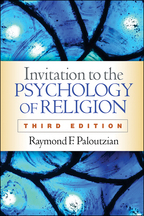Invitation to the Psychology of Religion
Third Edition
Raymond F. Paloutzian
HardcoverPaperbacke-bookprint + e-book
Hardcover
orderNovember 9, 2016
ISBN 9781462527557
Price: $92.00 428 Pages
Size: 6" x 9"
Paperback
orderNovember 10, 2016
ISBN 9781462527540
Price: $61.00 428 Pages
Size: 6" x 9"
“One of our most outstanding researchers and thought leaders, Paloutzian has given everyone who teaches the psychology of religion an enormous gift by completely revising and updating his excellent introductory text. The third edition is noteworthy for its historical perspective on the field, its presentation and critique of current research findings, and the way it is unified by the multilevel interdisciplinary paradigm. Paloutzian integrates a wide range of important human behaviors and experiences by anchoring them in a view of religion as a meaning system. He invites students to see how psychological studies of religion can guide their thinking about many other areas they may study, from neuropsychology to cultural psychology.”

—Susan H. McFadden, PhD, Department of Psychology (Emerita), University of Wisconsin Oshkosh
“This is an invaluable text for familiarizing students with a field that is expanding greatly. Much more than a simple update, the third edition is practically a new book. It is a rich and thoughtful introductory text that integrates past and present into a harmonious whole. The breadth of topics, findings, and theories covered reflects Paloutzian's panoramic view as editor of the flagship journal of the field for almost 20 years.”

—Vassilis Saroglou, PhD, Director, Center for Psychology of Religion, University of Louvain, Belgium
“True to its title, Invitation to the Psychology of Religion welcomes the reader with a spirit of genuine warmth and hospitality. Paloutzian provides a highly accessible, well-crafted overview of the field. He skillfully blends historical material, theory, methodological concerns, and research findings in a thoughtful, cohesive, and exciting way, giving the reader a taste of many topics while maintaining focus and interest throughout.”

—Julie J. Exline, PhD, Department of Psychological Sciences, Case Western Reserve University
“I enjoyed utilizing the prior edition of this text for many sections of my upper-level undergraduate class on the psychological study of religion. Paloutzian does a great job of clearly and accurately summarizing the relevant scientific literature while making complex material accessible and engaging. The text offers a critical-minded scientific survey of both foundational and substantive areas, including coverage of common life issues such as conversion, prayer, suffering, prejudice, and terrorism. I have found that using an authored text—rather than an edited volume or selection of articles—has the advantage of providing a coherent, overarching perspective on the field.”

—Stephen W. Cook, PhD, Department of Psychology and Counseling; Dean, Cynthia Ann Parker College of Liberal Arts, Hardin-Simmons University
“Paloutzian has done it again. His contribution to our psychological understanding of religion in the 21st century—and his comprehensive, lucid, and engaging presentation—have no rival. The updated third edition offers new insights about religion as a meaning system that is made and remade throughout life. This book is of interest to anyone who wants to know what psychology can offer to explain religious ideas and behavior. I recommend it as the textbook for all undergraduatestudents of the psychology of religion.”

—Miguel Farias, DPhil, Head of the Brain, Belief, and Behaviour Research Group, Coventry University, United Kingdom
—Susan H. McFadden, PhD, Department of Psychology (Emerita), University of Wisconsin Oshkosh
“This is an invaluable text for familiarizing students with a field that is expanding greatly. Much more than a simple update, the third edition is practically a new book. It is a rich and thoughtful introductory text that integrates past and present into a harmonious whole. The breadth of topics, findings, and theories covered reflects Paloutzian's panoramic view as editor of the flagship journal of the field for almost 20 years.”
—Vassilis Saroglou, PhD, Director, Center for Psychology of Religion, University of Louvain, Belgium
“True to its title, Invitation to the Psychology of Religion welcomes the reader with a spirit of genuine warmth and hospitality. Paloutzian provides a highly accessible, well-crafted overview of the field. He skillfully blends historical material, theory, methodological concerns, and research findings in a thoughtful, cohesive, and exciting way, giving the reader a taste of many topics while maintaining focus and interest throughout.”
—Julie J. Exline, PhD, Department of Psychological Sciences, Case Western Reserve University
“I enjoyed utilizing the prior edition of this text for many sections of my upper-level undergraduate class on the psychological study of religion. Paloutzian does a great job of clearly and accurately summarizing the relevant scientific literature while making complex material accessible and engaging. The text offers a critical-minded scientific survey of both foundational and substantive areas, including coverage of common life issues such as conversion, prayer, suffering, prejudice, and terrorism. I have found that using an authored text—rather than an edited volume or selection of articles—has the advantage of providing a coherent, overarching perspective on the field.”
—Stephen W. Cook, PhD, Department of Psychology and Counseling; Dean, Cynthia Ann Parker College of Liberal Arts, Hardin-Simmons University
“Paloutzian has done it again. His contribution to our psychological understanding of religion in the 21st century—and his comprehensive, lucid, and engaging presentation—have no rival. The updated third edition offers new insights about religion as a meaning system that is made and remade throughout life. This book is of interest to anyone who wants to know what psychology can offer to explain religious ideas and behavior. I recommend it as the textbook for all undergraduatestudents of the psychology of religion.”
—Miguel Farias, DPhil, Head of the Brain, Belief, and Behaviour Research Group, Coventry University, United Kingdom



